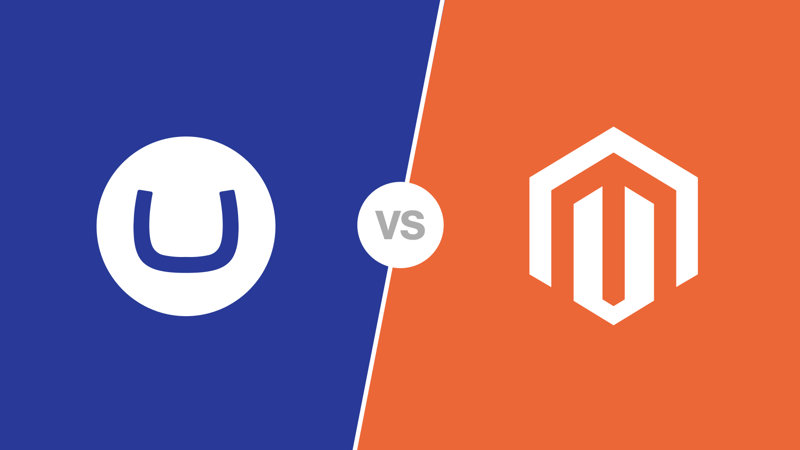Umbraco vs. Magento: choosing the right platform for your website

With the ever-growing demands of digital strategy and user expectations, choosing the right content management system (CMS) or e-commerce platform can play a significant role in the success of both your website and overall online presence.
Two popular choices - Umbraco and Magento, serve very different purposes.
If you’re wondering which platform is right for your project, this comparison will help you understand their key differences, strengths, and ideal use cases.
What is Umbraco?
Umbraco is an open-source CMS built on Microsoft’s .NET platform. Highly flexible, developer-friendly, and customisable, it’s ideal for corporate websites, intranets, and content-heavy portals; whilst it’s clean and intuitive content editing interface makes it easy for marketers and editors to manage content. It’s extensible, scalable architecture also allows developers to build custom workflows, templates, and integration, making it suitable for everything from small sites to enterprise applications.
What is Magento?
Part of Adobe Commerce, Magento is a powerful e-commerce platform built to handle the complexities of selling online. Designed with scalability and flexibility in mind, Magento is well-suited to businesses managing large product catalogues, multiple storefronts, or international sales, and is particularly useful for product management, order processing, customer segmentation, and marketing automation. It offers built-in features for SEO, promotions, and multi-store setups, along with thousands of extensions for customisation - making it
ideal for businesses that need deep e-commerce functionality, with the development resources to support it.
Umbraco vs. Magento: key differences
The most fundamental difference between Umbraco and Magento lies in their core strength - with Umbraco, for many businesses, offering a more versatile foundation.
While Magento is built specifically for e-commerce, Umbraco is a powerful content management system designed to handle content-rich websites with ease, making it particularly useful for organisations that prioritise storytelling, brand experience, and the ability to manage diverse types of content such as articles, landing pages, and structured data. With the addition of e-commerce packages like Vendr or Ucommerce, Umbraco can also support online sales, combining robust content management with tailored commerce functionality in a way that Magento (being commerce-first) often can't match when it comes to flexibility and editorial control.
Technologically, Umbraco runs on the .NET stack, making it a natural fit for organisations already aligned with Microsoft technologies. This allows for smooth integration with existing systems and development workflows within enterprise environments. Magento, on the other hand, is built with PHP and is now part of the Adobe ecosystem, which may appeal to businesses already using Adobe’s suite, however for many (especially those with Microsoft infrastructure) Umbraco offers a more cohesive and developer-friendly experience.
In terms of usability, Umbraco stands out with its clean, intuitive backend and streamlined content editing tools. It’s especially appreciated by content editors and marketers for its ease of use, particularly when customised by developers. Magento, while powerful, has a steeper learning curve and can be more complex to navigate, especially for non-technical users.
When it comes to customisation, Umbraco offers a high degree of flexibility through C# and Razor templates, making it ideal for content-rich websites that require tailored functionality and design. Magento is also highly customisable but often demands deeper PHP expertise and more development time to implement changes.
Finally, while Magento includes a comprehensive set of out-of-the-box SEO and marketing features, Umbraco takes a more modular approach, allowing businesses to integrate only the tools they need through third-party packages or custom solutions. This offers greater control and avoids unnecessary bloat, making Umbraco an efficient, scalable platform for organisations prioritising content management and editorial flexibility.
When to choose Umbraco?
Umbraco is well-suited to content-focused websites (such as corporate sites, government portals, and blogs), organisations within the Microsoft ecosystem, or those needing seamless integration with Microsoft tools and services; and with a clean backend experience and flexible architecture it benefits both developers and content editors – ultimately making it a strong choice for those who need complete control over how content is structured, presented, and managed.
When to choose Magento?
In comparison, Magento is ideal for businesses which revolve heavily around e-commerce, with customers ranging from single online stores to global e-commerce operations with multiple storefronts. It supports complex product catalogues, offers strong order and inventory management, and integrates with popular payment gateways out of the box; however it does demand a skilled development team to handle its setup, maintenance, security, and performance optimisation effectively.
Can you use both?
Some businesses choose to integrate Umbraco and Magento into a single solution—leveraging Umbraco for rich content experiences and Magento for transactional e-commerce capabilities. This hybrid model can be implemented using APIs or a headless architecture, allowing each platform to play to its strengths; the result being a seamless user experience that combines the editorial power of Umbraco with the sales engine of Magento.
Final thoughts
Essentially, the choice between Umbraco and Magento depends entirely on the goals and objectives of the individual digital project, however for organisations prioritising structured content, brand storytelling, and engaging digital experiences, Umbraco is the stronger option.
While Magento is purpose-built for e-commerce, with robust out-of-the-box functionality for product management, inventory, and complex transactional workflows, Umbraco can also integrate effectively with leading e-commerce platforms—offering the ability to deliver rich content, alongside powerful shopping experiences using one comprehensive solution.
Interested in hearing more?
Need help deciding between Umbraco and Magento for your business? Get in touch with the 16i team.
Share article:

2026 | Digital trends and predictions
Based on current trends and developments across the digital landscape, predictions suggests that 2026 will be shaped less by new technologies and more by how mature ones are applied— primarily driven by embedded AI, simpler digital experiences, evolving search behaviour, and rising expectations around privacy and trust. This blog explores the key areas where these shifts will be most visible.
Read more
2025 16i Christmas opening hours
Please note our hours will be slightly different during the holidays.
Read more
SGGBA 2025: Winners revealed
Congratulations to the winners of the SoGlos Business Awards 2025! Find out who they are!
Read more
Upgrading to Umbraco 17: a strategic investment for your business
Used and trusted by both developers and marketers, Umbraco offers a high level of customisability, with the latest long-term-supported (LTS) version (Umbraco 17) currently scheduled for release in November 2025. Featuring improved performance and developer tooling, alongside support for the latest .NET versions, Umbraco 17 offers a number of benefits including enhanced security, streamlined workflows, and improved scalability.
Read more
How to avoid website project horror stories!
Maybe you've been there before, maybe this is your first time creating a website. We have seen website projects at all stages turn from dreams into nightmares very easily, often being the ones at the other end helping our soon to be clients put it back on the right path.
Read more
Exploring the benefits of Umbraco 17: a leap forward in CMS flexibility and performance
Umbraco has long held the reputation as a flexible, developer‑friendly content management system (CMS) and with the release of Umbraco 17 scheduled for November 2025, the platform is continuing to evolve. Umbraco 17 will be the next Long‑Term Support (LTS) version, aligned with the upcoming .NET 10 LTS release, and is expected to include enhancements in performance, developer experience, and content workflow modernisation.
Read more
The future is bright for the Sub Rooms
New website and Spektrix integration helped Sub Rooms turn a corner
Read more
Website builders vs bespoke: which is right for your business?
In a digital-first world, a company’s website (and its overall effectiveness) is of paramount importance, serving as both the first impression and initial introduction to a brand. Traditionally built from the ground up by experienced developers, website creation has become increasingly accessible, primarily due to the rise of website builders such as Squarespace, Wix, Weebly, and Webflow, These platforms offer powerful tools, sleek templates, and rapid setup options, without the need for direct developer involvement. However, for businesses with more complex or unique requirements, they can be limiting, with many instead opting for bespoke development tailored to the specific project goals, workflows, and user experience. This blog outlines the pros and cons of each –off-the-shelf website builders vs bespoke development.
Read more